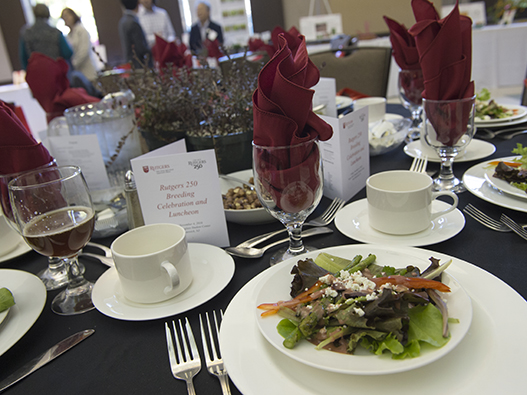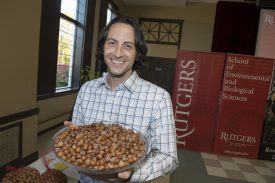
The salad served at the Rutgers 250 Breeding Celebration and Luncheon featured lettuce, asparagus, candied hazelnuts and a strawberry vinaigrette.
From November 10, 2015 through the end of 2016, the Rutgers New Jersey Agricultural Experiment Station (NJAES) has been celebrating Rutgers 250th anniversary by showcasing an all-star variety from its plant and shellfish breeding programs each month. The select varieties are developed by Rutgers agriculture and aquaculture researchers from across New Jersey.
Through the NJAES, the university has been and continues to breed varieties of fruits and vegetables, and even nuts and shellfish, which play key roles in the food and agriculture industries. Plant breeding began at NJAES in 1900, with numerous new varieties of vegetables developed, and large quantities of seeds distributed to New Jersey farmers for propagation. Over the past 100+ years, some of the breeding efforts are for species native to New Jersey like cranberries and oysters, others have been traditional agricultural crops of key importance to New Jersey ag, like tomatoes, strawberries and peaches, and still others are new and innovative crops with potential for new markets, like hazelnuts and hot peppers.

Plant Biology & Pathology associate professor Tom Molnar (CC’00; GSNB’06) shows hazelnuts from his breeding program. Photo by Nick Romanenko
Recognizing that the Rutgers NJAES breeding items would make enticing dishes for a celebratory meal, the experiment station held a Rutgers 250 Breeding and Celebration Luncheon on November 4 in New Brunswick to highlight these important agricultural products and the role they play in the New Jersey agriculture and food industries. The event encompassed a banquet of these foods, the breeders who are developing them, New Jersey food entrepreneurs, and key players in the ag and food industries of New Jersey. NJAES faculty in attendance included breeders for cranberries, strawberries, peaches, hazelnut, basil, tomato, asparagus, oysters, hot peppers, lettuce, turfgrass, holly, and dogwoods. NJAES speakers included Department of Plant Biology and Pathology distinguished professor Jim Simon who discussed breeding downy mildew‐resistant basil and other products, and associate professor Tom Molnar (CC’00; GSNB’06) who talked about his work breeding eastern filbert blight‐resistant hazelnut trees. Guest speakers included Secretary of Agriculture Doug Fisher and New Jersey food industry entrepreneur Patrick Leger of First Field.

Director of Rutgers Food Innovation Center Lou Cooperhouse (l) talks with New Jersey Secretary of Agriculture, Douglas Fisher at the Breeding Celebration and Luncheon. Photo by Nick Romanenko
Secretary Fisher stated, “The 250th celebration of the Rutgers Breeding Program, when you break it all down, has enormous implications for all residents across the state, and frankly across the country, and across the world. Because the research they do is vitally important on so many different levels − whether for health of populations in terms of new varieties of crops that have nutrient values higher than older varieties; whether its disease resistant varieties that we can’t grow anymore and trying to find solutions like hazelnuts − as secretary of agriculture, I’m interested in what Rutgers can help our farmers do in the field for research in disease and pests.”
The event was a celebration of the decades of revolutionary research during Rutgers 250th anniversary and provided networking opportunities for agricultural stakeholders. Brad Hillman, research director for NJAES, commented, “Plant breeding has been essential to experiment stations around the U.S. in general, and especially at Rutgers. As development of new plant products takes many years to fruition, supporting these programs is a long-term investment. Many other universities have eliminated their plant breeding programs, but Rutgers stands out in the longevity and diversity of its breeding programs.”
In addition to the breeding products incorporated into the menu, other New Jersey food products served included cheese, meat, ice cream, wine, beer, and peach cider. A special batch of First Field marinara sauce made with the Rutgers 250 tomato was bottled and given as gifts to attendees, as well as cranberry plants from commercial cranberry propagators, Integrity Propagation.
Sponsors for the event included several ag and food organizations, including Integrity Propagation, First Field, The Winemakers Co-Op, River Horse Brewery, Triumph Brewing Company, Rare Find Nursery, Cherry Grove Farm, Adams County Nursery, and Edible Garden Corp. Donors included Olive Creek Farms, The Bent Spoon, Circle M Farms, Atlantic Capes Fisheries, along with Rutgers Marucci Center for Cranberry and Blueberry Research, Horticultural Research Farm 1 and 3, Snyder Research and Extension Farm, and the Haskin Shellfish Research Laboratory. The food companies that participated either source their ingredients from New Jersey farms, produce their products in New Jersey, and/or worked with Rutgers Food Innovation Center to develop their products.
Anna Molinski (SEBS’14), NJAES program coordinator and organizer of the Rutgers 250 Breeding Celebration and Luncheon, was able to showcase the foods from the breeding programs by integrating the menu, breeder participation, and New Jersey food companies that work with Rutgers and New Jersey products. Molinski stated, “This event was made possible thanks to the help of our sponsors and donors. They were a pleasure to work with and we greatly appreciate their support and contribution. Based on feedback we have been receiving, the Rutgers 250 Breeding Celebration and Luncheon was very well received – the food was delicious, speakers were passionate, and the mood was cheerful. This celebration served as an opportunity to connect researchers from the many NJAES breeding programs with public interest groups in a way that has never been done before.”

